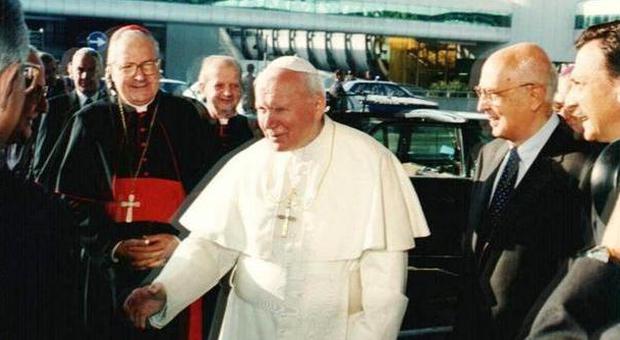At this ceremony his friend Bronislaw Komorowski, President of the Polish Republic, will be present in St Peter’s Square: who already took part, together with all his predecessors and other authorities from his country, in the beatification ceremony in Rome in 2011. Poland is grateful to Pope Wojtyla. It knows how much it owes him.
And it is to John Paul II’s relationship with the development of the European unification process that I wish to dedicate this brief memory. It is about a process which took place during his pontificate which presented problems and uncertainties, and from which came decisive pressures revolving around the Polish question. John Paul II believed in the radical conviction, made plain since his election but at that time not shared by everyone, that Europe should not be destined to remain divided into two separate “worlds” because it was linked by deep historical and spiritual bonds. Could the cause for freedom – not only religious but first of all religious – and the national independence of Poland be seen and resolved without that liberating change to embrace together the countries of central and eastern Europe encapsulated in the soviet bloc? And could such a change be considered and realised in terms that were not those of an enlargement of the European Union?
I think that the answers to these questions clearly showed the way John Paul II operated. The basic problem was to believe it possible, and not in an unforeseen and long distant future, the system crisis and the communist bloc, and to identify the correct and most efficacious approach to bring about this hypothetical change.
In his Biography of John Paul II, Andrea Riccardi has minutely analysed the problems which emerged in the relationship between the direction the Polish Pontiff tended to follow and that which characterised the political action conducted in east Europe by Cardinal Casaroli, who became his Secretary of State. But also political forces and governing bodies of the European Union were faced with the problem of the significance and repercussions of an Ostpolitik (a distended policy toward the East), envisaged to overcome the tensions and risks of the cold war and encourage the liberating tendencies within the oriental block. It was necessary to avoid that farsighted choices, culminating in the Conference and the “Final Act” at Helsinki, would reflect an over-evaluation of the holding capacity and the duration of the Eastern regimes and therefore a philosophy of prudent conservation on the part of democratic Europe before that controlled by the USSR.
John Paul II’s courage consisted in the challenge – without losing a necessary balance and sense of responsibility – through the strength of the Church’s “spiritual diplomacy”, on the strength of his personal, intense, steadfast preaching of Christian values and the principles of liberty as being able to shake the resignation of society – especially in Poland – and to encourage movements like that most representative and combative one of Solidarnosc.
It can be said, I think, that the first break in the “wall” occurred not in Berlin in November 1989 but - and not only by chance - in Poland in the spring of that year with a “Round Table” which suddenly led to free elections in that country and the victory – through the democratic weapon of popular vote - of Solidarnosc in opposition to communist power. I closely followed the run-up to those elections, participating in an international conference in Cracow and meeting immediately afterwards in Warsaw the representatives of Solidarnosc, the dominating party (POUP) and the Cardinal Józef Glemp circle. It was through that breach and the historical opening of the European Union doors that twelve new member States passed – first of all Poland – or rather the effective unification of the continent on the basis of peace and freedom.
The canonisation of John Paul II glorifies now the extraordinary nature – more than human – of the inspiration which guided him in an enormous effort of service, not only of Christians and their Church, but of Europe and its universal values.
Translation by Antoinette Canini
© All rights reserved
© RIPRODUZIONE RISERVATA
